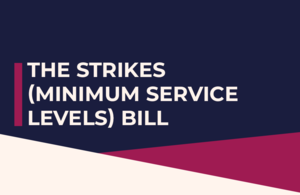Government introduces laws to mitigate the disruption of strikes on the public
New laws will allow government to set minimum levels of service which must be met during strikes to ensure the safety of the public and their access to public services.

- New laws will allow government to set minimum levels of service which must be met during strikes to ensure the safety of the public and their access to public services
- the Strikes (Minimum Service Levels) Bill will ensure crucial public services such as rail, ambulances, and fire services maintain a minimum service during industrial action, reducing risk to life and ensuring the public can still get to work
- Business Secretary Grant Shapps said in Parliament today: “We do not want to have to use this legislation unless we have to, but we must ensure the safety of the British public.”
Millions of hard-working people across the UK will be protected from disruptive strikes thanks to new laws introduced today, which will allow employers in critical public sectors to maintain minimum levels of service during strikes.
The government is introducing this legislation to ensure that striking workers don’t put the public’s lives at risk and prevent people getting to work, accessing healthcare, and safely going about their daily lives.
The government will first consult on minimum service levels for fire, ambulance, and rail services, recognising the severe disruption that the public faces when these services are impacted by strikes, especially the immediate risk to public safety when blue light services are disrupted.
The government hopes to not have to use these powers for other sectors included in the Bill, such as education, other transport services, border security, other health services and nuclear decommissioning.
The government expects parties in these sectors to reach a sensible and voluntary agreement between each other on delivering a reasonable level of service when there is strike action. This will, however, be kept under review and the Bill gives the government the power to step in and set minimum service levels should that become necessary.
Business Secretary Grant Shapps said:
The first job of any government is to keep the public safe. Because whilst we absolutely believe in the ability to strike, we are duty-bound to protect the lives and livelihoods of the British people.
I am introducing a bill that will give government the power to ensure that vital public services will have to maintain a basic function, by delivering minimum safety levels ensuring that lives and livelihoods are not lost.
We do not want to have to use this legislation unless we have to, but we must ensure the safety of the British public.
The sectors the legislation includes are:
- health services
- education services
- fire and rescue services
- transport services
- decommissioning of nuclear installations and management of radioactive waste and spent fuel
- border security
This principle is already recognised in many countries across the world, such as Italy and Spain, where systems for applying minimum levels during strikes are in place for services the public depend on.
As is the case currently a union will lose its legal protection from damages if it does not comply with the obligations set for them within the legislation.
Today’s reforms come as government ministers are meeting trade unions to discuss fair and affordable public sector pay settlements for 2023 to 2024.